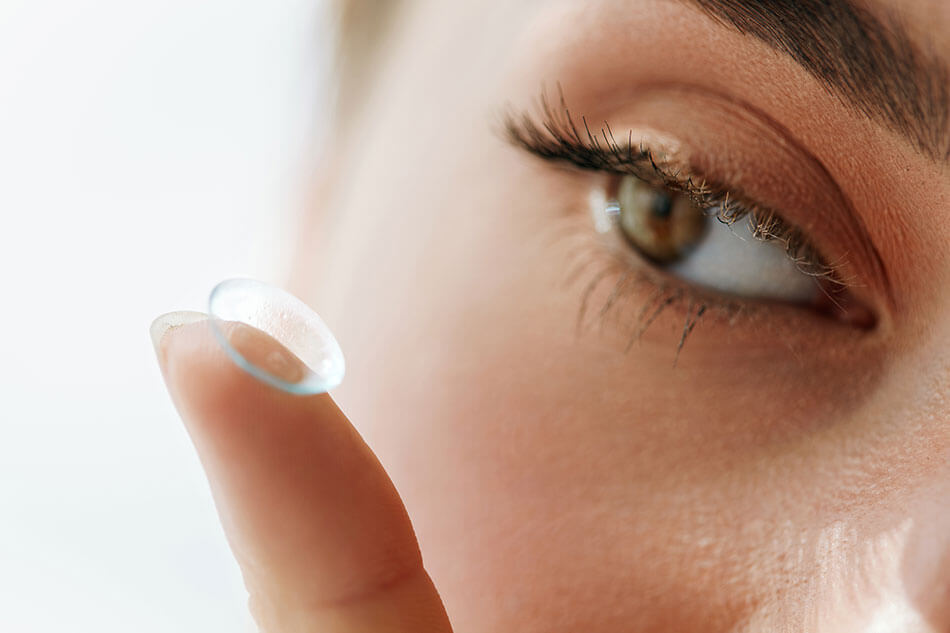(I wear contact lenses and thought this would be an interesting guest post).
More than 50 million people around the globe wear contact lenses. They are a highly popular and very discreet way to correct vision problems. However, not all contact lenses are suitable for patients with specific eye conditions, including keratoconus and dry eye problems.
These patients may benefit from scleral lenses instead. These specialist lenses are an increasingly popular solution with ophthalmologists. Read on to find out what makes them unique and whether you are a patient who may benefit.
What are scleral lenses?
Scleral lenses are large-diameter lenses. This means that they are wide enough to sit over the entire corneal surface and some of the sclera, or the white part of the eye. This is what sets them apart from other rigid lenses which usually only cover around 75%-80% of the cornea.
The larger surface area of scleral lenses makes them a viable contact lens option for many patients unsuited to other contact lenses, including those with corneal irregularities where regular lenses would not fit over the cornea comfortably.
Scleral lenses are also gas-permeable lenses. This means they allow oxygen and carbon dioxide to pass through, which is important for eye health. Rigid gas-permeable lenses, including scleral lenses, are a comfortable, durable and long-lasting option for vision correction.
Who exactly may benefit from scleral lenses?
Scleral lenses are increasingly being used to treat patients with the following conditions: ● Ocular Surface (Dry Eye) Disease
Scleral lenses can be helpful to patients suffering from dry eyes caused by Ocular Surface Disease. Dry eye is an uncomfortable condition that occurs when the eye does not produce enough tears, or when tears are poor quality (i.e., lacking in the lubricating agents normally and naturally produced by the eye).
The scleral lens effectively allows a reservoir of tears to form between the back of the lens and the eye’s surface. The large surface area of the lens means a considerable proportion of the eye is then kept well-lubricated.
Research by the Kellogg Center in the US suggests that using scleral lenses for the relief of dry eye disease is “efficacious and well tolerated, with most reports citing improved visual acuity and relief of symptoms.”
Scleral lenses are particularly useful as a prescription for severe Ocular Surface Disease (i.e., Stevens-Johnson syndrome, graft-versus-host disease, neurotrophic keratitis, or exposure keratitis). These conditions can otherwise be difficult to treat. ● Corneal Irregularities
Corneal ectasia refers to a variety of vision problems that are related to irregularities in the shape of the cornea. These include keratoconus, which is an eye disorder that occurs when the cornea thins and bulges slightly, distorting it from its usual dome shape.
Corneal ectasia can also be experienced by patients post-refractive surgery or corneal transplants.
The larger diameter of scleral lenses makes them more accommodating to corneal irregularities. They should be able to cope with any degree of corneal steepness or unusual shape and still be comfortable for the wearer. As the lenses do not touch the cornea (they float above it instead), they are also suitable for patients with corneal damage as healing will not be inhibited.
These two significant advantages make them suitable for a great many patients with corneal irregularities.
What are the key benefits of scleral lenses?
The main benefit of scleral lenses is that they can help patients who cannot wear other types of contact lenses. However, there are other benefits too, many of which apply to all contact lenses. ● A non-surgical treatment
Many keratoconus patients do not wish to undergo surgery, and scleral lenses can help them avoid this. ● A wider field of vision
Glasses may be an option for patients with mild keratoconus. However, contact lenses typically offer an unobstructed, wider field of vision than eyeglasses. ● Invisibility
Contact lenses are almost invisible when worn. This suits patients who do not wish to wear glasses for cosmetic reasons. For many, their discreteness is the main reason for choosing contact lenses. ● Convenience
Compared to glasses, contact lenses offer much greater convenience. They will not get wet in the rain or steam up. They are much easier to wear for many activities, particularly sports, and are much less likely to get lost or broken in any situation.
Some occupations, such as those using microscopes or cameras, make it awkward to wear glasses. Contact lenses solve this problem.● Comfort
Scleral lenses are comfortable, even for those with more severe keratoconus. Unlike glasses, they do not rub or cause pressure sores from extended use.
Those with Ocular Surface Disorder should experience a significant reduction in uncomfortable symptoms once prescribed scleral lenses.
Are there any disadvantages to scleral lenses?
Scleral lenses sit very close to the limbus, the area of the eye where the cornea and sclera meet. If the limbus is damaged, then long-term problems are created. However, to date, there’s no clinical evidence of this happening to a patient wearing well fitted scleral lenses. It is essential however to be fitted by an experienced Specialty Contact lens fitter, to ensure a comfortable and safe fitting.
All in all, scleral contact lenses are thought to be a very safe, worthwhile option for patients who need solutions for dry eyes or corneal irregularities.
Sources:
https://www.aao.org/eyenet/article/update-on-scleral-lenses
https://www.ncbi.nlm.nih.gov/pubmed/26058032
https://www.reviewofcontactlenses.com/article/scleral-lenses-an-overlooked-fix-for-dry-eye-
AUTHOR BIO
Dr. Millicent M. Grim, Specialist Ophthalmologist & LASIK Specialist, is the Medical Director of Gulf Eye Center in Dubai. Since 2002, Gulf Eye Center’s highly qualified ophthalmologists and optometrists/ODs have been successfully treating a wide range of eye conditions using advanced techniques. They also provide comprehensive eye care and vision restoration procedures for people of all ages.

No Comments